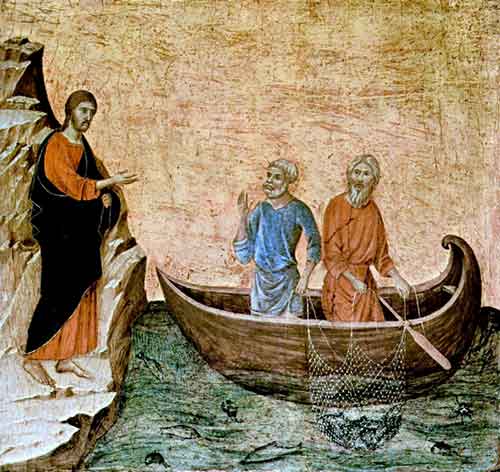
As Jesus passed along the Sea of Galilee, he saw Simon and his brother Andrew casting a net into the lake—for they were fishermen. And Jesus said to them, ‘Follow me and I will make you fish for people.’ And immediately they left their nets and followed him. As he went a little farther, he saw James son of Zebedee and his brother John, who were in their boat mending the nets. Immediately he called them; and they left their father Zebedee in the boat with the hired men, and followed him.
Mark 1:16-20
Περιπατῶν δὲ παρὰ τὴν θάλασσαν τῆς Γαλιλαίας εἶδεν Σίμωνα Καὶ Ἀνδρέαν τὸν ἀδελφὸν αὐτοῦ βάλλοντας ἀμφίβληστρον ἐν τῇ θαλάσσῃ· ἦσαν γὰρ ἁλιεῖς
καὶ εἶπεν αὐτοῖς ὁ Ἰησοῦς Δεῦτε ὀπίσω μου καὶ ποιήσω ὑμᾶς γενέσθαι ἁλιεῖς ἀνθρώπων
καὶ εὐθέως ἀφέντες τὰ δίκτυα αὐτῶν, ἠκολούθησαν αὐτῷ
Καὶ προβὰς ἐκεῖθεν ὀλίγον εἶδεν Ἰάκωβον τὸν τοῦ Ζεβεδαίου καὶ Ἰωάννην τὸν ἀδελφὸν αὐτοῦ καὶ αὐτοὺς ἐν τῷ πλοίῳ καταρτίζοντας τὰ δίκτυα
καὶ εὐθεὼς ἐκάλεσεν αὐτούς καὶ ἀφέντες τὸν πατέρα αὐτῶν Ζεβεδαῖον ἐν τῷ πλοίῳ μετὰ τῶν μισθωτῶν ἀπῆλθον ὀπίσω αὐτοῦ
θάλασσαν – sea; obviously this is a lake, not a sea.
Σίμωνα – Simon; Mark uses this as his name until Mark 3:16. Simon is a significant name in the Hebrew tradition, the second son of Jacob and Leah (Gen 29:33) etc.
Ἀνδρέαν – Andrew, on the other hand, is a Greek name not even found in LXX.
ἐν τῇ θαλάσσῃ – into the sea; mistranslated in NRSV as “into the lake”
ἦσαν γὰρ ἁλιεῖς – they were for fishermen. Surprise! [Not!] They were “casting a net into the lake [ie sea]”
Δεῦτε ὀπίσω μου – come after me; translated as “follow me” – it is actually an unusual construction, an adverbial imperative, in the way we might say, “forward!” Disciples of a rabbi might walk just behind the rabbi, “in the dust of the rabbi”.
ἁλιεῖς ἀνθρώπων – fishers of people; is this an ironic statement – fishing for fish kills the fish; is here fishing for people to give them life in its fullness? Is Jesus enlarging John the Baptist’s vision and mission after he has been imprisoned? And will he gather more people for this vision and mission during the dry season (March – September)? That is also the time when people could move around [though moving around was culturally abnormal, except for pilgrimage]. Is the connection to Jeremiah 16:16:
I am now sending for many fishermen, says the Lord, and they shall catch them; and afterwards I will send for many hunters, and they shall hunt them from every mountain and every hill, and out of the clefts of the rocks.
God, in Jeremiah 16:16, is condemning Israel. Is Jesus inviting them to join him in radically changing the abusive religious and political context?
καὶ εὐθέως – And immediately; we must be in Mark where everything happens εὐθέως, immediately.
ἀφέντες – leave, forsake (their nets)
Ἰάκωβον – “James” actually “Jacob” another name strong in the Hebrew tradition, brother of Esau and father of the twelve tribes (his name was changed to “Israel”). Later termed “James the Great”.
Ἰωάννην – “John” a Hebrew name יוֹחָנָן (Yôḥānān) or יְהוֹחָנָן (Yəhôḥānān) “Yahweh has been gracious”.
καταρτίζοντας – to mend, to repair, to prepare, to arrange; is the story saying Jesus is calling those who are fishing and those who are preparing to fish/ just about to set off. Fishing was normally a night time or early morning activity.
καὶ εὐθεὼς – Immediately; we are in Mark…
καὶ ἀφέντες τὸν πατέρα αὐτῶν Ζεβεδαῖον ἐν τῷ πλοίῳ – leaving their dad in the boat; this couldn’t be more culturally offensive…
μετὰ τῶν μισθωτῶν – with the hired servants. Mark has Peter and Andrew less wealthy, fishing with leaded nets from the shore; James (Jacob) and John have a boat and hired servants. They would use a dragnet, getting a much larger haul of fish. Overturning the the abusive religious and political context begins in the life of those called – these are not simply poor, hand-to-mouth peasants, they have a boat and a business that hires workers.
ἀπῆλθον ὀπίσω αὐτοῦ – they went after/behind him; cf Δεῦτε ὀπίσω μου – come after me!
As this year the Sunday Gospel reading focus is on St Mark’s Gospel, This is some of my personal study and Lectio Divina with that Gospel.
This is the seventh post in a series – you can begin here:
Mark in Slow Motion 1
Mark in Slow Motion 2
Mark in Slow Motion 3
Mark in Slow Motion 4
Mark in Slow Motion 5
Mark in Slow Motion 6


